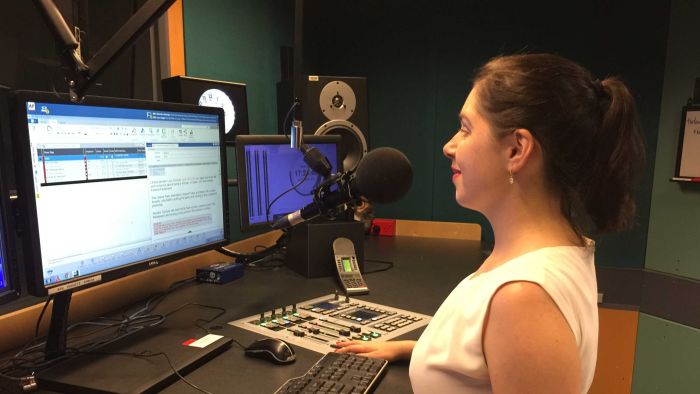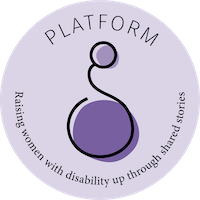Sometimes it is an incidental advocate, a teacher, a family member or friend who can change the course of our lives.. The power that one person, one experience, negative or positive can have on us cannot be underestimated. It is often not until we are old enough to reflect that we recognise that moment in time for what it was and how it influenced us and our future one way or another.
Nas Campanella’s journey of disability made an impact on her that has set her path for being a powerful advocate, role model and agent of change for others.
I am so proud to introduce to you my friend and fellow advocate Nas Campanella in the first of our Inspired stories for the year.
Tell us about yourself
I’m Nas Campanella. I’m 31, I live in Sydney, grew up in Western Sydney and now live in the inner city. I love yoga and running and cooking. I’m a journalist and news reader at the ABC. (on Triple J)
I also have a side business where I do public speaking and emceeing and disability awareness training for schools, charities and big corporate.
What has been your journey of disability?
I was born with vision, but when I was about six months old, the blood vessels burst in the back of my eyes and they detached my retinas and that essentially left me blind. I’ve got the tiniest bit of light perception and ability to see shadows, but it’s very unreliable and I can’t ever make out what the shadows are.
I also have a muscle condition, which I was diagnosed with quite late, about nine or 10 years of age. It’s called Charcot Marie tooth neuropathy or CMT. It’s basically a neurological condition which affects a person’s balance sensitivity and causes muscles to waste away in their hands, arms, legs and feet.
So for me, I guess the most prominent sort of manifestation of that is that I was really struggling to read braille growing up as a kid in early primary school. I was a really great writer and had memorized the alphabet really quickly and things, but I just wasn’t able to make out the words on the page, and it was because of that of sensitivity that I ended up being diagnosed with CMT.
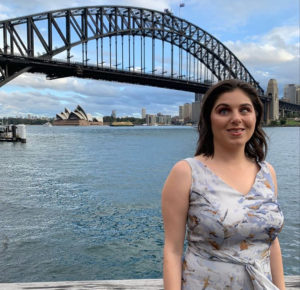
When you had those issues around your education, what did that mean for you about catching up?
I did really lag behind for a long time because of the inability to read, only once we had a diagnosis of CMT was it a really big turning point because it meant that we could then get the right support.
How was that for you not being able to read braille?
I had things like a new support teacher come to the school and she was really flexible and well versed in adapting the education for particular people to suit their needs. She introduced me to things like audio books and JAWS screen reading software, which is this little sort of robotic voice that kind of scanned everything on the screen.
Once I got the hang of that, those bits of technology and learning how to touch type and all of that stuff, I really started to want to learn. Up until about nine or 10 I had no interest in learning because it was always really hard and something I got quite anxious and stressed about.
I often went to bed in tears as a kid because I used to feel really stupid. Once I got hold of that technology and I started to really thrive in learning how to use it, it opened up all these different doors.
I had a bit of catching up to do. It took a little while, but I ended up getting there in the end.
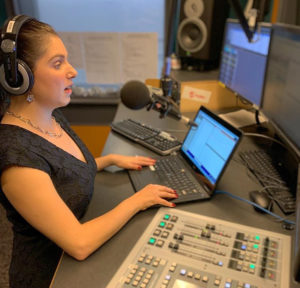
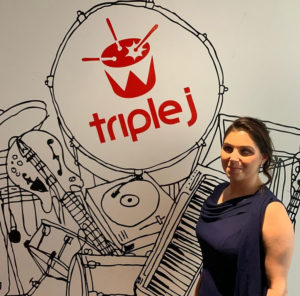
How do you feel that it took identifying another “issue” happening, for you to get the support you really needed to thrive?
For a long time, I had a support teacher who probably wasn’t the greatest influence. She was someone who when my parents asked about maybe getting tests done was very much of the view that I was lazy and that I wasn’t trying hard enough; that perhaps I was staying up too late and watching, listening to TV rather than going to bed and therefore losing concentration really quickly and stuff.
I think once you’ve got really good support mechanisms around you and you have people who believe in you, in your abilities, then you can kind of conceive that it might not actually be you, it might be the environment around you and there might be a reason for it.
Are there things about you that people misunderstand because of your disability?
I think the things people misunderstand about me are probably things that people generally misunderstand about anyone with a disability. It’s changed as I’ve grown up and gotten older, but people are still impressed that I get around. Impressed that I’m out on my own and that I work and that I have a partner.
I can’t tell you how many people stop me in the street recently and wanting to have a chat or whatever then they always just assume that we’re not going to have children. What else? Oh, that I like that I might dress really nice and how impressive that is.
I think then some of the other things are still kind of strong stigmas that are lingering around the workplace. Not my workplace, but just the idea of people with disabilities working in general.
Things like it’s too expensive to hire us. Employers think they’ve got to make all these changes. They’ve got to lower the standards and expectations for us, that we’ll need double the time to get things done, that we’ll need too much time off and therefore we’re not productive members of staff. All of that stuff. It’s still very much hanging around in the background and that’s not specific to me at all.
I think the only real way to make change, is not even these employment pushes that happen regularly. It’s just simply making people part of the community.
When people see me walking around doing my shopping or see you getting around in your community. It’s normal and it would just be nice for people that they might go to another city on holidays or something and see someone else who’s blind getting around using a cane independently.
It won’t be weird for them because they’ve seen me back home, and it would just be nice to get to a point where you just look around in magazines or TV or on the catwalk or the workplace in the shops and you just see people with disabilities everywhere and therefore it won’t be that weird.
Literally this morning I’m in there at the post office buying a dollar stamp to put on a postcard that I want to send. I walked to the counter and the woman beside me touched my shoulder and said, oh you’re you such an inspiration? How do you even react? Like I don’t even know what to say. And I didn’t say thank you I never say thank you. But I’d have said okay. And then just walked off. I just thought, Oh my gosh. It’s just the weirdest.
“When you have good people around you can only really do good things, that for me meant, man,
anything’s possible.”
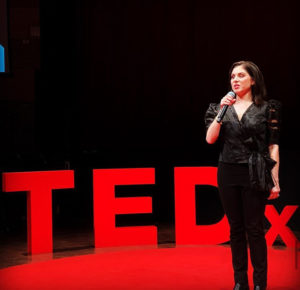
Where do you get inspiration from?
Oh, lots of different things. I’ve lots of inspiration from friends who some have disabilities and others don’t. And it’s for different reasons and different, I guess aspects of my life. There are people with disabilities like Carly Findlay who has Ichthyosis. She has been a very wonderfully outspoken advocate and been so generous, especially in her new book that she’s just written about either providing information and advice for people in the community who don’t have a disability. I think she’s really put herself out there and I take a lot of motivation from that.
And then friends, just personal friends of mine who I’ve grown up with or gone to school with who don’t have a disability, but they’ve fallen on hard times at some point in their life and they’ve picked themselves right up and come out with brilliant careers, amazing families wonderful sort of life experience.
I’ve been able to go, oh yeah, that’s something I might be interested in. Something that they might be volunteering in or they might be trying sailing for the first time and they love it and then I’ll go and try it as well, that kind of thing. So it’s really, I guess no one being famous, just really friends and family who you see being able to make the best out of life.
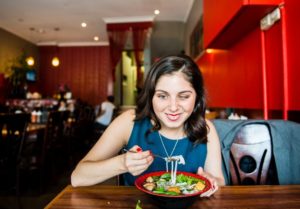
Which three words would you use to describe yourself?
Energetic. Determined. Positive
What is one thing, experience or person you have had that completely changed your life?
I think it really does go back for me to right back to primary school when I did have that support teacher who really did put me in this box when she didn’t even know me and couldn’t really bother to get to know me and my abilities. She was saying things like that I was lazy and that I wasn’t trying hard enough with the reading and I think that really got me down even as a child.
When I think back, I remember how many times I cried myself to sleep or how many arguments I’d have with my parents just because they’d sit me down and force me to read and then how many arguments they had because mum was of the, “teachers always know best we have to try harder and do this thing.”
No, we actually should have to listen to our kid and know neither one was wrong. It was making them argue as well.
I just really realize looking back at the impact that this one person, this one negative person could have on so many people’s lives and how it made me feel. I think that experience alone has really been the essence of why I’ve now wanted to be an advocate and change things for other people.
I think that’s when I really learned that things like the education system need to change for you as an individual, not you change to fit in with it. I think it made me just say, “you know what? I’m never going to let anybody treat me like that again”. I think that’s made me really forthright, very assertive. I have a sort of attitude where I won’t let people tell me no or say that I can’t do something ever again.Because as a kid you don’t know, right? and if you don’t have someone that sort of stands up for you immediately you may never know.
My parents did stand up for me, but it took a little while because they’d never even met someone with a disability before. So for them, they just thought teachers all knew best, and if it were me, I would’ve felt the same thing. Unless you have that person, who’s been through that experience before, who knows what to do or what to say, how to react. That’s why I try and be an advocate for younger people going through it now.
Who or what has been the most significant influences on who you are today?
There have been lots but probably, the teacher who came to replace that awful negative teacher.
I have this teacher who bounced in with complete enthusiasm and positivity and everything was going to work. That was like her motto and she would stay back for hours when school had finished to make dioramas of things and tactile maps. For math’s and geography and you know, graphs and things. She would read magazines on tape for me because that was the only way I could access them back.Then she’d go to great lengths to make sure that I was motivated. I wasn’t really a sporty kid, so when it was time to do sport for everybody else on a Thursday afternoon, she found me a community radio station to go and do community radio work because she knew that I was far more interested that. She just went above and beyond to find opportunities that would give me a long-term benefit. I’m forever grateful for her. I think, again, that influenced me. When you have good people around you can only really do good things, that for me meant, man, anything’s possible. If you really put in the hard yards and I’m really grateful for that.
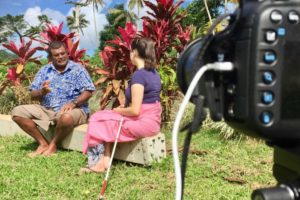
Nastasia Campanella recording an interview in Fiji for her first TV news story. (ABC News: Aaron Kearney)
What’s one thing about you that surprises people?
I used to be a singer. Oh, I don’t do it much anymore. I used to do music and singing and stuff at school and I loved it. But I just don’t get enough time to do it now apart from the shower and I’m a huge, huge Yogi.
I do yoga probably three times a week. I love to meditate and sometimes I think because I go at a million miles an hour, people are surprised to hear that because I think they’re surprised that there is a switch off button. I think that’s why I love yoga so much, because I do know when to switch off and it’s that hour and a half when I’m on the mat where for me nothing exists except just your thoughts and not even your thoughts, just your breath.
For what are you most grateful today?
I’m grateful for really good family and friends who are there to pick you up when the chips are down, who were there to pull you out of your own head, who pull you out of your own thoughts sometimes, because your own thoughts can be great, but your own thoughts can also be the worst enemy.
They’re always there to provide practical support, which I’m forever grateful for, and of course, really good friends who are truly motivating and they’re all doing really big things with their careers and study and personal lives.
It’s that thing when you’ve got good people around you who are reaching new heights, you kind of want to strive to do the same. I think I’m forever grateful for that because it’s gotten me to get up and probably try things that I wouldn’t have tried in the part, or to succeed at things that I never thought I would.
Knowing what you know now, what advice would you give your 18-year-old self?
I’d probably tell me to be more comfortable in the skin that I was in. Maybe not 18, maybe if I was thinking about going back a bit further, just being more comfortable with the skin that I was born in because it’s something that I’ve actually drawn really great strengths from in the last few years.
As I get older, I know who I am and I’m really content with that person and I think that persons changed a lot over the years. I think the essence of that person has always been there. The values that I hold dear and the things I’ve loved, and think are important and that issues I’m passionate about and I wish that in the past I had been more confident to express those views or just felt more comfortable to be me.
“I wish that in the past I had been more confident to express those views or just felt more comfortable to be me.
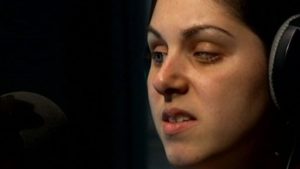
Do you have a funny story or an experience that has happened only due to having a disability that you would like to share?
My brother used to always put veggies on my plate when we were younger because he didn’t want to eat them, and I didn’t know they were being put on the plate! So I’ve grown up with this love of broccoli and cauliflower because it just felt like I was always getting more than everyone else.
Is there something that you would like people to know about you or about people with disability that they might not know?
That we’re normal people, like everybody else. We all just want to be treated like you treat everybody else around you.
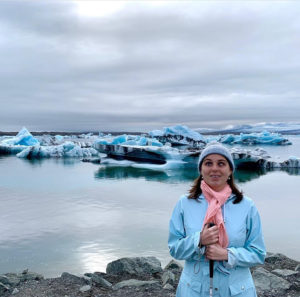
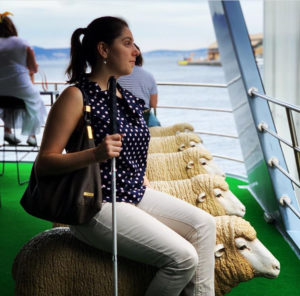
Do you have any advice or something you know that made a difference in your life journey that you would like to share with other women with disabilities?
I’m a big believer in you live and you learn and even though the lessons have been hard sometimes, I’m still really happy that I went through them because it means I can help other people. At the same time, I don’t want to tell people exactly what they should do because it is part of the journey of figuring out, who to trust and what works for you because telling someone what to do because it works for me, doesn’t mean it’s going to work for them as well.
I think it’s just simply about telling your story and people will take from it what they want. I think not only is it the control remains with them of how they live their lives and you know what they do and the decisions they make, but also it just means that it reinforces this whole kind of notion that we are like everybody else.
We are completely different people. While I have thought that transferring for example, into mainstream education was exactly the right thing that my parents should have done for me, I’ve spoken to other people who it wasn’t for them at all.
I’m very much about just be yourself, live and learn and just try and take a lesson from everything that happens, no matter if it’s good or bad.

